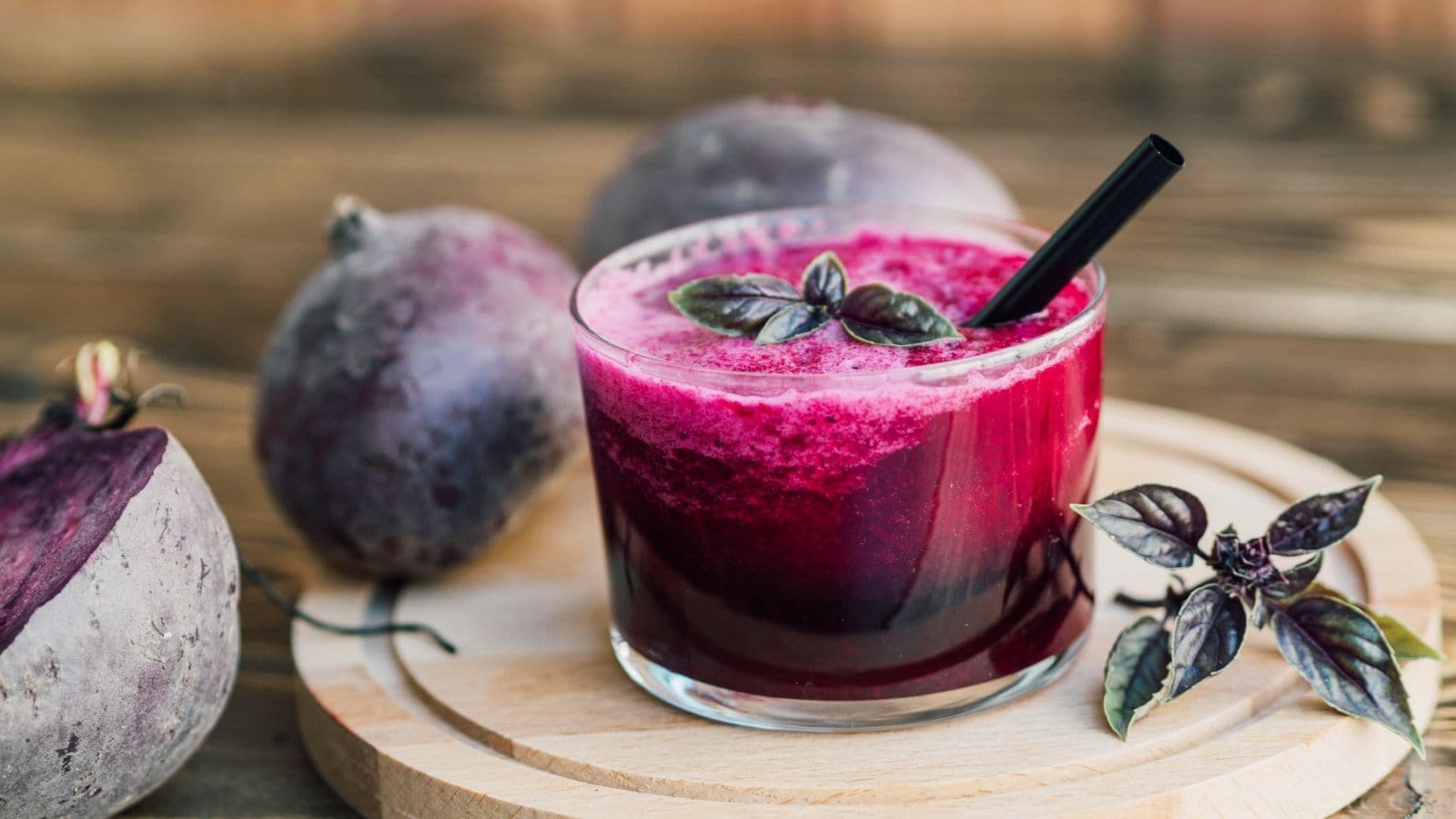Beet juice and other nitrate-rich vegetables can support older adults in reducing blood pressure naturally, says a new study by University of Exeter researchers.
For years, nutrition experts have recommended vegetables for heart health, but new research spotlights one in particular: beetroot. A recent study led by the University of Exeter reveals that drinking nitrate-rich beet juice can lower blood pressure in older adults naturally and in as little as two weeks!
There are multiple health benefits of beetroot juice. But the new study, published in Free Radical Biology and Medicine, specifically found that consuming nitrate-rich beetroot juice twice daily for just two weeks led to measurable reductions in blood pressure among older adults.
A total of 39 adults under 30 and 36 adults in their 60s and 70s were recruited by researchers at the NIHR Exeter Clinical Research Facility, to study the effects of nitrate-rich beetroot juice. Each participant spent two weeks drinking beetroot juice and two weeks drinking a nitrate-free placebo version, with a two-week break in between. The team then analyzed changes in oral bacteria using gene sequencing.
According to Science Daily, The older age group experienced a notable decrease in the mouth bacteria Prevotella after drinking the nitrate-rich juice, and an increase in the growth of bacteria known to benefit health. The older group had higher average blood pressure at the start of the study, which fell after taking the nitrate-rich beetroot juice, but not after taking the placebo supplement.
Professor Anni Vanhatalo of the University of Exeter, says: “We know that a nitrate-rich diet has health benefits, and older people produce less of their own nitric oxide as they age. They also tend to have higher blood pressure, which can be linked to cardiovascular complications like heart attack and stroke. Encouraging older adults to consume more nitrate-rich vegetables could have significant long term health benefits.”
Key insights from the study
- Older adults drank concentrated beetroot juice ‘shots’ twice a day for two weeks and saw a significant drop in blood pressure—a benefit not observed in younger participants.
- The effect is linked to changes in the oral microbiome, the community of bacteria in the mouth. Beet juice suppressed potentially harmful bacteria and promoted beneficial ones, improving the body’s ability to convert dietary nitrate into nitric oxide.
- Nitric oxide is critical for blood vessel health. It promotes vasodilation—helping vessels relax and widen—which is essential for maintaining healthy blood pressure.
- As people age, their natural nitric oxide production declines, and blood pressure often rises, increasing the risk of heart disease, heart attack, and stroke.
How beet juice works
Beetroot and other vegetables are rich in nitrate, a compound converted first to nitrite by oral bacteria, then to nitric oxide in the body. By improving the balance of oral bacteria, beet juice helps maximize this conversion process, especially in older adults whose oral microbiomes may have shifted with age.
Indian nutritionist Nisha says regular consumption of beetroot can help lower blood pressure naturally by improving blood vessel health, while also boosting stamina and energy through better oxygen delivery.
Explaining its other health benefits, she tells Health Shots: “Its antioxidants, especially betalains, fight inflammation and support heart and brain health. Being high in fiber, beetroot also aids digestion and promotes gut health, while its detoxifying properties assist the liver in flushing out toxins. Overall, adding beetroot to your diet is a simple way to enhance cardiovascular, digestive, and overall wellness.”
How to add beetroot to your diet?
Beet juice may not be most tempting for many people. In that case, you may try the following use to increase beetroot consumption in your diet.
- Juice shot: Try to mix fresh beet with carrot and apple for a refreshing drink.
- Salads: Grate raw beetroot into salads with cucumber, carrot, and lemon.
- Smoothies: Blend cooked beetroot with yogurt (or dairy-free curd), berries, and chia seeds.
- Soups: Make a warming beetroot soup with ginger and garlic.
- Roasted Snack: Roast beetroot wedges with olive oil, salt, and herbs.
- Raita: Add grated beetroot to yogurt with cumin and mint.
- Paratha/ Dosa: Mix grated beetroot into paratha dough or dosa batter for color and nutrition.
- Chutney: Blend beetroot with coconut, garlic, and chillies for a vibrant dip.
Tips to manage blood pressure naturally
- Incorporate nitrate-rich vegetables: If beetroot isn’t your favorite, try spinach, rocket (arugula), fennel, celery, or kale—these all boost dietary nitrate.
- Mind your oral health: Since the oral microbiome is key, avoid overusing mouthwash, which can kill helpful bacteria necessary for nitrate conversion.
- Consider daily beet juice shots: For older adults, two concentrated beetroot juice shots per day can be a simple, food-based strategy to support blood pressure health.
- Monitor your blood pressure: If you’re considering dietary changes for hypertension, consult with your healthcare provider, especially if you’re on medication.








